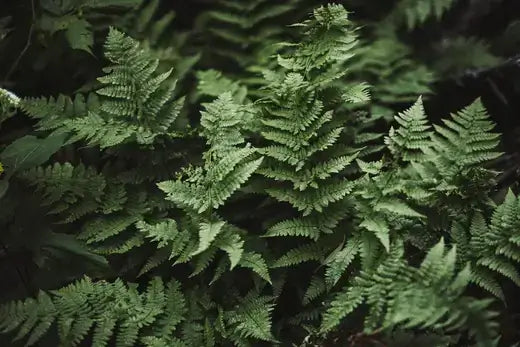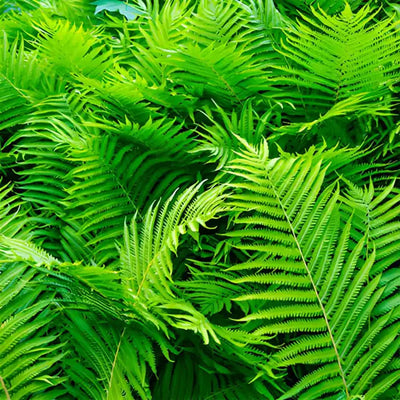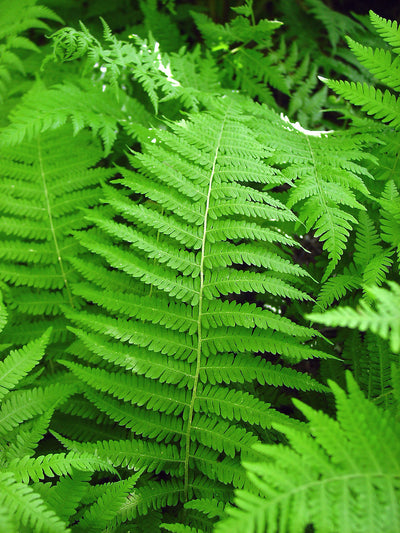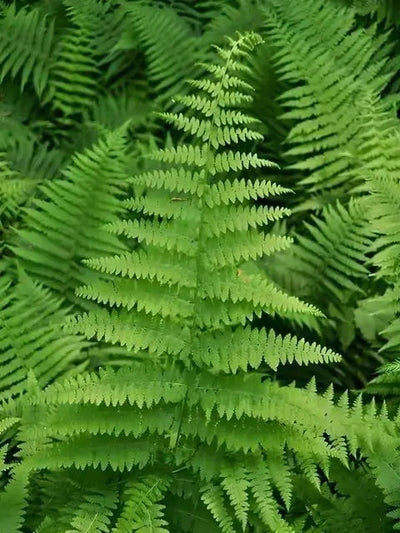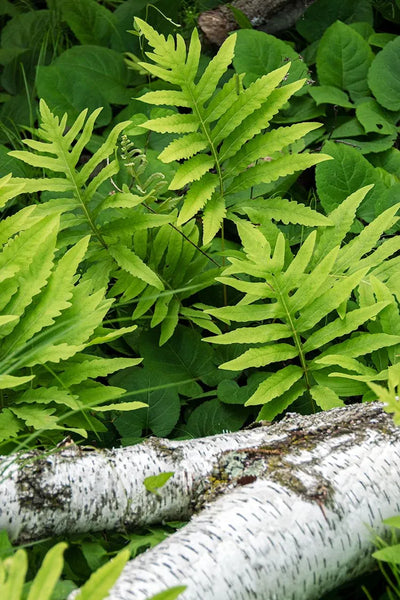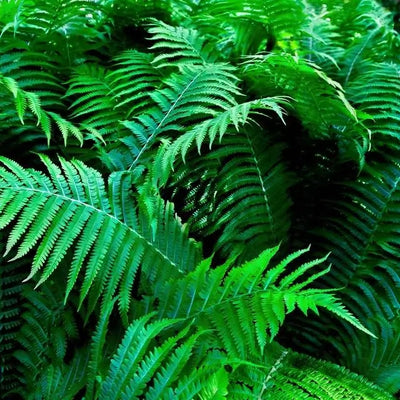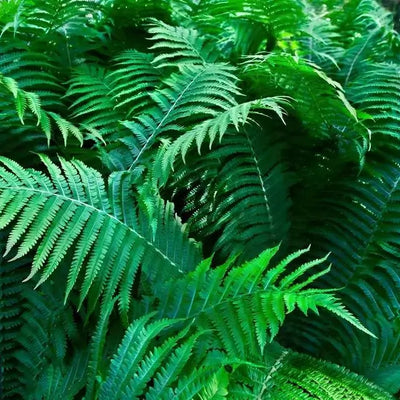Introduction to Bracken Ferns
This article has everything you need to know about Bracken ferns. From their growing habits to ideal planting conditions, we try to answer all your fern-related questions. Whether you are an avid gardener or a beginner plant enthusiast, the Bracken fern can add a natural, lush look to your garden.
Historical and Biological Overview
The Bracken fern is a member of the Dennstaedtiaceae family. Its binomial Latin name, Pteridium aquilinum, means 'eagle’s wings'. It was given that name because of its triangular shape, similar to the wings of an eagle. Ferns are prehistoric plants that have been around for millions of years. That means that the fern you have in your garden is a fern that dinosaurs would have seen. These are some of the oldest plants in the world! While ferns are considered a plant, they are in a different phylum or division than most other garden plants. Unlike most plants you may find in a nursery, ferns reproduce by spores. Male Bracken ferns have sori on them which are dots on the leaves that release spores into the natural surroundings. From the spores, new ferns can grow. Bracken ferns can also spread through their root system. They can develop an extensive, far-reaching root system. From their roots or rhizomes, new sprouts can form and grow more ferns.
Identifying and Growing Bracken Ferns
Bracken ferns are easy to identify with their tapered, triangular fronds. They grow to an average height of around 3 feet but can grow as tall as seven feet. Their spread ranges from three to five feet. Along their triangular fronds, they have pinnate leaflets. The sori, or fruit dots from which the spores originate, are located on the edges of the leaflets.
Where Does the Bracken Fern Grow
Bracken ferns have been located on all continents except Antarctica. These ferns have grown in woodlands, fields, marshes, roadsides, and locations that have been scorched by fire. They thrive in sandy soils and can tolerate being planted in rocky soils. They prefer acidic soils and are not often found in alkaline soils. Contrary to popular belief, some ferns don’t need full shade. Most do best with partial sunlight and others require full sun. The Bracken fern can tolerate full sun but will do best when it has occasional shade throughout the day.
The Spreading Nature of Bracken Ferns
The Bracken ferns rootstock has a spreading habit. The underground rhizome can spread great distances. A single root can spread up to 20 feet! Because of this, Bracken ferns are known to fill in large areas of ground. Due to their spreading nature, we do not recommend Bracken ferns for formal gardens unless they are containerized. Instead, we suggest planting them in woodland gardens where they can take up a lot of space. Bracken ferns are deciduous perennials, meaning that they will return year after year. Because they are deciduous plants, Bracken ferns will lose their foliage in winter and their vegetation will die back. In spring, young fiddleheads will appear and eventually form fronds.
Toxicity and Safety Concerns
We do not recommend you plant the Bracken fern in areas where livestock is present due to its toxicity. If ingested once, the Bracken fern is not acutely toxic. However, if this fern is consumed by livestock regularly, it can cause central nervous system disease. There is a chemical in ferns that can deplete an animal's thiamin reserves. Humans should not ingest ferns or fern parts. Historically, some cultures have eaten fiddleheads, the young, curled fern sprouts. However, researchers have determined that fiddleheads have some carcinogenic compounds. This means that fiddleheads if eaten in excess, have the potential to cause cancer. Fortunately, most people and animals avoid eating ferns, so toxicity is rarely an issue.
Benefits and Reasons to Buy a Bracken Fern
These ferns are sturdy, resilient plants. A single plant can fill in a woodland space in the span of a few years. They are low to no-maintenance plants that thrive with almost no care. They give woodland gardens a truly natural feel. They add dense foliage to a woodland providing the space with texture and a sense of unity.
Growing Conditions
When buying a Bracken fern, first ensure you have the ideal growing conditions. Ferns are notorious spreaders and need space to expand. The Bracken fern is no exception and thrives in spacious woodland gardens. This fern is one of the most recognized ferns out there. It is native to eastern North America and thrives in acidic and sandy soils.
Ideal Conditions and Varieties
This perennial fern should be planted in gardens where it has room to spread.
Zones: 3 to 9
Sun exposure: Full sun to part shade
Mature height: average of 3 feet but can grow up to 7 feet
Water: Average to dry
Best for woodlands and pots.
If you aren't sold on the Bracken fern, no worries. There are plenty of other ferns to choose from:
New York Fern
The New York fern has similarly shaped fronds as the Bracken fern but grows lower to the ground. It has a spreading habit, so we recommend it for containers or woodland gardens.
Zones: 3 to 8
Sun exposure: Full shade
Mature height: average of 2 to 3 feet
Water: moist
Best for woodlands, shaded gardens, and containers
Hay-Scented Fern
The Hay-Scented fern gets its name from its mild grassy smell. It is a versatile perennial fern that can grow in rocky, sandy, or moist soils. The Hay-scented fern makes an excellent ground cover for shade gardens.
Zones: 3 to 9
Sun exposure: Part sun to part shade
Mature height: up to 3 feet
Water: Average
Best for woodlands and pots
Cinnamon Fern
The Cinnamon fern is a lush perennial fern that grows in bogs and woodlands. Its fronds can grow up to five feet making them an ideal low-screen woodland plant. They have a spreading habit like the other ferns, so they will do best in open spaces or pots.
Zones: 3 to 9
Sun exposure: Part sun to part shade
Mature height: from 3 to 5 feet
Water: Average
Best for woodlands and containers
Sensitive Fern
Sensitive ferns are deciduous perennial ferns. Their leaves will die off in winter, but new fiddleheads will form again in spring. This low-growing fern thrives in part sun and will add a natural look to any woodland garden.
Zones: 3 to 9
Sun exposure: Part sun to part shade
Mature height: up to 2 feet
Water: Average
Best for woodlands and pots
Fern Variety Packs
If you are not sure which fern you prefer, we sell several variety packs. With this option, you can receive shade-loving ferns and sun-loving ferns, tall ferns and ferns that grow lower to the ground. You will likely receive a Bracken fern plus plenty of others. This way you can decide what suits your style without having to compromise.
Shade Fern Package (10 plants)
If you have any more questions about the Bracken Fern or other ferns (or any plant for that matter) feel free to reach out to us! We love talking plants with anyone who has questions-- that's what we're here for!
